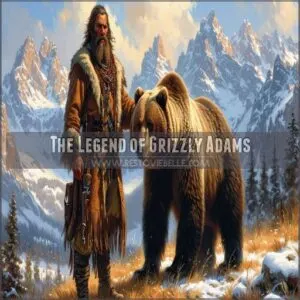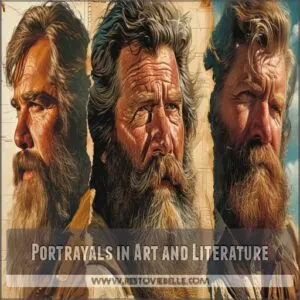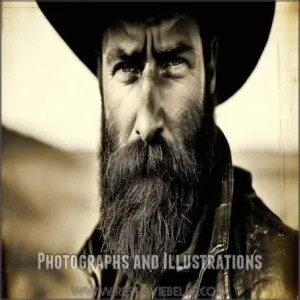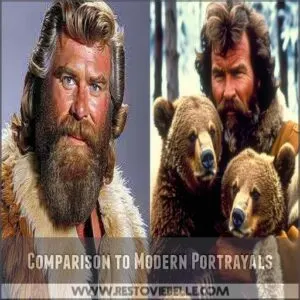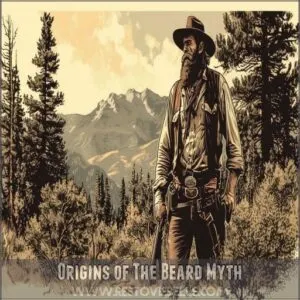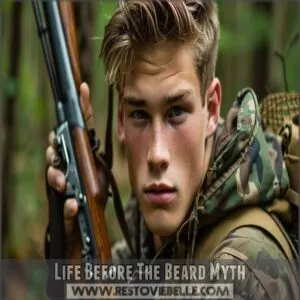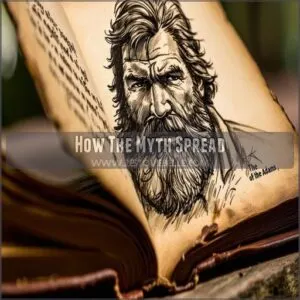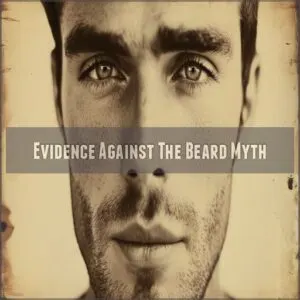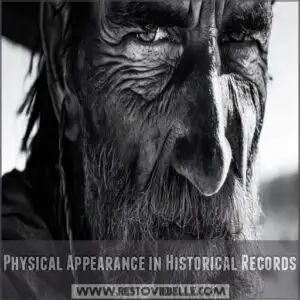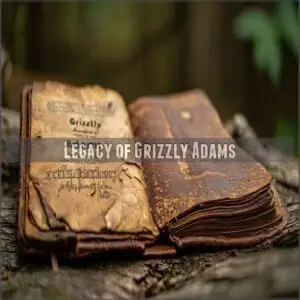This site is supported by our readers. We may earn a commission, at no cost to you, if you purchase through links.
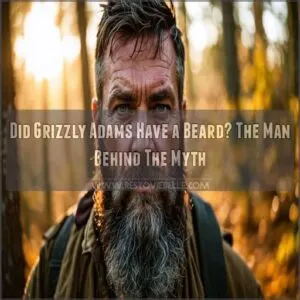 Yes, Grizzly Adams really did have a beard.
Yes, Grizzly Adams really did have a beard.
John "Grizzly" Adams, a 19th-century mountain man, was famed not just for his uncanny bond with bears but also for his distinctive facial hair.
While Lee Trevino humorously referenced this in "Happy Gilmore," it’s no tall tale.
Contemporary accounts and illustrations confirm Adams sported a beard worthy of any wilderness adventure.
Given his rugged lifestyle, it’s only fitting that a beard became part of his legendary image.
But did this beard actually contribute to his bear-whispering prowess?
Now that’s a hairy question worth pondering.
Table Of Contents
- Key Takeaways
- The Legend of Grizzly Adams
- Did Grizzly Adams Have a Beard
- Origins of The Beard Myth
- Grizzly Adams’ Physical Appearance
- Legacy of Grizzly Adams
- Frequently Asked Questions (FAQs)
- Who is Grizzly Adams?
- Was Grizzly Adams a bearded man?
- Did Grizzly Adams fight Grizzly bears?
- How did John Adams obtain a grizzly bear?
- Did James Capen Adams paint a grizzly bear?
- What does Adams learn about grizzly bears?
- Did John Quincy Adams have a beard?
- Did Grizzly Adams have a beer?
- Was Grizzly Adams based on a real person?
- Why did Grizzly Adams live in the woods?
- What animals did Grizzly Adams keep?
- How did he survive the bear attack?
- Why did he join P.T. Barnum?
- What was his early life in Massachusetts like?
- How did his injuries impact his life?
- Conclusion
Key Takeaways
- You’ll find that Grizzly Adams was indeed a legendary mountain man known for his bond with bears, though his iconic beard’s prominence is debatable.
- Historical accounts vary, but contemporary illustrations often emphasized his rugged look, blending fact with myth about his notable facial hair.
- In pop culture, Grizzly Adams’ beard has become a symbol of his wild, adventurous persona, though this image may be more romanticized than historically accurate.
- Despite the myths, Adams’ real story is captivating for his survival skills and intriguing interactions with wildlife, rather than just his beard.
The Legend of Grizzly Adams
You’ve probably heard of Grizzly Adams, the legendary mountain man, friend to bears, and inspiration for a popular TV show.
However, separating fact from fiction in his story requires a closer look at the man himself,
because the legend often overshadows the reality.
Grizzly Adams’ Real Name
James Adams, or as most know him, Grizzly Adams, has a name steeped in the wilderness lore of the American West.
Born in 1812, this Massachusetts native ventured beyond shoemaking, claiming a family tie to the illustrious Adams clan of American patriots.
His ancestry, though possibly exaggerated, set the stage for a life blending rugged myth with reality.
His Life and Adventures
Life threw more than a few curveballs at Grizzly Adams, whose adventures were anything but typical. As you uncover his tale, you’ll find:
- California Gold Rush escape artist: Not just about shiny rocks!
- Wildlife encounters: Bears were more than just furry friends.
- Grizzly bear attacks: He’d a scar for every story.
- Edutainment career: Educating crowds with true grit.
Trapping and Mountain Man Life
Picture yourself as Grizzly Adams, traversing the wild Sierra Nevada.
His trapping skills were your ticket to survival, darting through pine forests, wary of lurking mountain dangers.
Mastering wilderness tools, he thrived amidst the fur trade’s rugged demands.
Amidst nature’s chaos, this pioneer life wasn’t just survival—it was embracing freedom with a side of adventure, a quirky frontier reality.
Bear Handling and Training
A hunter’s life opens the door to unpredictable encounters, and Grizzly Adams was no stranger to the wild dance of bear handling.
Taming Lady Washington and a 1,500-pound Samson, he tread the fine line of bear behavior and human daring.
Adams’ training methods and safety precautions might’ve been loose, but his bond with bears reshaped bear-human relationships, warts and all.
Did Grizzly Adams Have a Beard
You might think a man nicknamed "Grizzly" would naturally sport a wild beard, but the truth isn’t as clear-cut as his renowned facial hair suggests.
Despite popular portrayals, historical accounts and illustrations present a more ambiguous picture, leaving us to question if Grizzly Adams’ beard was more myth than reality.
Descriptions From Contemporary Accounts
Ever wonder if Grizzly Adams truly sported a beard, as tales suggest? Contemporary accounts paint a vivid picture of his rugged persona—beard or no beard. Fans can even find various beard-inspired products Adams beard photos that celebrate his iconic look.
- Physical characteristics were often exaggerated, adding flavor to the legend.
- Descriptions of appearance frequently highlight his commanding presence and wild attire.
- Clothing details sometimes overshadowed his facial hair in these narratives.
Portrayals in Art and Literature
While exploring Grizzly Adams in literature, you’ll find wildly different depictions. Some portray him as a rugged, bearded mountain man, others not so much. It’s a sign of how legends morph over time.
Here’s a glimpse of how artists and writers have interpreted his image:
| Source | Beard? | Accuracy? | Notes | Style |
|---|---|---|---|---|
| Early newspaper accounts | Varies | Questionable | Often exaggerated for sensationalism. | Sensationalist |
| 1970s TV series | Yes | Low | Heavily romanticized; a far cry from reality. | Romanticized |
| Recent historical novels | Varies | Higher | Attempting more nuanced portrayals. | More Realistic |
| Fictional children’s books | Yes | Low | Simplified for younger audiences. | Simplified |
Photographs and Illustrations
You’ve seen art and heard tales of Grizzly Adams, but what do the photographs and illustrations say? It’s hard to find genuine images, but,
- Grizzly’s bushy beard appears in few authentic photos.
- Illustrations often showcase his bear-handling skills.
- Many images blur fact and fiction of his rugged life.
- Visual representations amplify the myth of his legendary adventures.
Comparison to Modern Portrayals
In comparing Grizzly Adams to his modern portrayals, it’s clear the TV series took some…liberties.
The bushy beard and bear companionship are vivid examples of fictional embellishments.
Historical accuracy? Perhaps not, but character development and thematic differences create a legend audiences love.
While not mirror images, both Adams and his fictional self offer wild tales that captivate us.
Origins of The Beard Myth
You might think Grizzly Adams’ famous beard was as real as his knack for befriending bears, but the truth sneaks in under the guise of fanciful storytelling from 19th-century American culture.
Beards then weren’t just facial features; they symbolized rugged independence, setting the stage for the myth that refuses to shave off its allure.
Historical Context of Beards
Back in Grizzly Adams’ time, a well-groomed Viking beard symbolized power and authenticity, often achieved through trimming and sculpting techniques. Beards symbolized more than just facial hair. It was a mix of practicality and rebellion. Beards in America spoke of a rugged life, where:
- They offered protection from harsh elements.
- Signified defiance against European clean-shaven norms.
- Served as societal status during the Gold Rush.
- Represented individuality in burgeoning frontier culture.
Beards in The 19th Century
The 19th century wasn’t shy about beard styles, with facial hair trends shaping men’s faces and reputations.
Victorian beards became a symbol of masculinity, often boasting impressive lengths that rivaled today’s craft beer enthusiasts.
While hygiene and grooming were sometimes questionable back then, a well-groomed beard was as much a statement as your modern-day sports car.
Beards in The Mountain Man Culture
Many mountain men sported impressive beards, a reflection of their rugged lifestyles.
Think of it: months, even years, without a barber!
Their beard styles, often unkempt, reflected their independence.
Grooming practices were minimal; beard care was less about fashion and more about survival.
This wasn’t some carefully crafted image; it was a practical necessity.
The beards became part of their identity, a symbol of their hardiness.
The Significance of Beards in The American West
Beards in the American West were more than just facial fluff; they were symbols of masculinity and frontier grit. Imagine crossing prairies without a razor! Research shows that does a beard make you look more masculine, and the answer is yes.
Here’s the lowdown:
- Status Symbol: A full beard showed rugged endurance.
- Practicality: It kept you warm during harsh winters.
- Identity: Part of the mountain man persona.
- Rebellion: A subtle nod against societal norms.
The beard wasn’t just hair—it was a frontier statement.
Grizzly Adams’ Physical Appearance
You’ve probably imagined Grizzly Adams with a beard so grand it could house a family of small birds, but historical records suggest his grooming habits weren’t that wild.
While his rugged lifestyle might convince you otherwise, evidence shows he often kept his facial hair less majestic than the legends imply.
Life Before The Beard Myth
Imagine this: a shoemaker from New England turned adventurer, James “Grizzly” Adams wasn’t just defined by whiskers.
Early on, his life revolved around the shoemaking craft and thrilling hunts as a zoological collector.
Before the California Gold Rush pulled him west, Adams led a rugged but not particularly bushy mission—capturing the wild’s essence without a beard.
How The Myth Spread
Legend has it that Grizzly Adams sported a majestic beard, but how did this curious myth spread like wildfire?
Explore media portrayals and tall tales that turned whispers into Wild West myths.
Engage with:
- Frontier legends retold
- Illustrations exaggerating features
- Books blending fact and fiction
- Word of mouth folklore
- Pop culture fueling the fire
Evidence Against The Beard Myth
So, you’re trying to picture Grizzly Adams with a beard, right?
Turns out, contemporary accounts mix things up a bit.
Historical photos and physical descriptions point to a more rugged look, minus the legendary facial hair.
You can even find products inspired by his appearance online, such as those offered in the Grizzly Adams store collection at Grizzly Adams products.
Maybe the man himself didn’t quite match those bushy-bearded images in old illustrations, making us rethink Grizzly’s appearance altogether.
Physical Appearance in Historical Records
Perhaps you’d expect Grizzly Adams’ height and weight to be readily chronicled, but historical accounts are sketchy.
Details like hair color or eye color turn murky when records are:
- Sparse and inconsistent
- Left to romantic historians
- Blended with myth and folklore
- More focused on his legendary exploits
Still, his rugged clothing style is well-documented, suggesting a practical frontiersman.
Legacy of Grizzly Adams
You’ve probably heard of Grizzly Adams, the legendary mountain man, but his legacy’s a bit of a mixed bag.
While the TV show cemented his image in popular culture, it also wildly exaggerated his real-life adventures.
This leaves us with a fascinating, if somewhat fictionalized, figure.
Influence on American Folklore
Grizzly Adams snuck his way into American folklore like a clever fox, blending truth with the mountain man myth. He became an essential piece of Wild West culture, symbolizing freedom and frontier grit.
Through tales and whispers, he morphed into an iconic figure.
Mythical Status
Adventure
Toughness
Icon
Adaptations and Interpretations
The legend of Grizzly Adams frequently finds itself tangled in a web of movie adaptations and modern interpretations.
Despite historical inaccuracies sprinkled throughout, the TV show captured imaginations with its whimsical charm, and some may have wondered if the show’s portrayal of his rugged look, complete with a beard and possibly long hairstyles and their appeal, was an accurate representation.
Fictional elements often overshadowed reality, painting a more rugged image.
Yet, beneath the bearded myth lies a fascinating story that’s as untamed as the wilderness itself.
Lasting Impact on Popular Culture
Right at the center of pop culture, Grizzly Adams, with his rugged wilderness persona, has left an indelible mark.
His iconic Grizzly Adams beard style has even inspired a range of products, from care tools to grooming kits available at Grizzly Adams beard shops.
The TV show’s influence and modern-day interpretations keep his myth alive, mingling facts with fiction.
Through film and TV, he shapes cultural views on survival and freedom.
These enduring stories romanticize the American wilderness, enthralling generations anew.
Why Grizzly Adams Remains an Icon
Often celebrated as a wild west hero, Grizzly Adams embodies the romantic allure of the mountain man myth and American legend.
His fearless frontier life, with thrilling bear encounters, captivates the imagination even today.
He survives as an icon not just for his rugged adventures but for inspiring tales where reality blurs with fiction, cementing his place in folklore.
Frequently Asked Questions (FAQs)
Who is Grizzly Adams?
Grizzly Adams wasn’t just a name; he was a legend, a mountain man whose life story, a tangled mix of truth and tall tales, captivated generations.
James "Grizzly" Adams, a real person, lived a life far less glamorous than his TV portrayal.
He was a struggling shoemaker who found himself amidst the California Gold Rush.
Was Grizzly Adams a bearded man?
You bet Grizzly Adams had a beard!
His bushy beard became an iconic part of his rugged image, symbolizing the wild frontier spirit.
It’s a look that could make even the most untamed mountain man envious.
Did Grizzly Adams fight Grizzly bears?
Where there’s smoke, there’s fire.
Grizzly Adams didn’t just wrestle with the idea of fighting bears—he actually survived a grizzly bear attack, sustaining serious injuries.
His life was marked by real encounters with these majestic creatures.
How did John Adams obtain a grizzly bear?
John Adams captured a grizzly bear by trapping a female cub named Lady Washington in California’s wilderness.
His knack for taming wild animals, coupled with some frontier luck, led to this unique and formidable companionship.
Did James Capen Adams paint a grizzly bear?
Like a painter without a canvas, James Capen Adams didn’t paint grizzly bears; he captured their wild spirit instead.
Grizzly Adams was more about wrestling bears than painting them.
What does Adams learn about grizzly bears?
Adams learned grizzly bears have a fierce nature and can be unpredictable, which he discovered when a bear attack left him severely injured.
Despite this, his friendship with some bears showed their capacity for loyalty and companionship.
Did John Quincy Adams have a beard?
Surprisingly, John Quincy Adams didn’t sport a beard, opting for the clean-shaven look that was all the rage among 19th-century politicians.
Unlike the rugged wilderness, his face remained as barren as an autumn apple tree.
Did Grizzly Adams have a beer?
Imagine this: a mountain man, legendary Grizzly Adams.
He sported a famously bushy beard, a true reflection of his rugged lifestyle.
So yes, the man had a beard, a magnificent one at that!
Was Grizzly Adams based on a real person?
Grizzly Adams was indeed a real person, a mountain man named James "Grizzly" Adams.
His bushy beard and adventures with bears inspired a 1970s TV show that mixed a bit of fact with quite a bit of fiction.
Why did Grizzly Adams live in the woods?
You might think Grizzly Adams headed for the woods seeking peace or adventure, but truth is, after losing his ranch to creditors, he’d little choice.
Nature became his refuge, and bears, his unexpected companions and business partners.
What animals did Grizzly Adams keep?
As an adventurer and zoo collector, Grizzly Adams kept a variety of wild animals.
He had a female grizzly bear cub named Lady Washington.
He also had a 1,500-pound grizzly bear named Samson.
Grizzly Adams even kept a Bengal tiger.
How did he survive the bear attack?
Surviving surprisingly close calls was his specialty.
When a grizzly bear attacked, one of Adams’ own grizzly cubs, Benjamin Franklin, distracted the bear long enough for him to escape, albeit with scars he’d carry forever.
Why did he join P.T. Barnum?
Joining P.T. Barnum might make you chuckle, considering Grizzly Adams was a rugged loner who thrived in wilderness chaos.
Yet he sought broader fame and fortune, exchanging solitude for the bustling spectacle of showbiz in
What was his early life in Massachusetts like?
You’d find young James Adams in Medway, Massachusetts, apprenticed to a shoemaker at 14, later becoming a skilled hunter.
He even had a family before his wild west adventures.
How did his injuries impact his life?
Grizzly Adams’ injuries, like his bear attack scars and tiger-inflicted spinal damage, shaped him into a rugged survivor.
Returning to shoemaking offered stability, but his scars told tales, blending struggle with adventure and etching his legend.
Conclusion
As the saying goes, "Don’t judge a book by its cover," and Grizzly Adams proves that a beard alone doesn’t define a legend.
The famous question, did Grizzly Adams have a beard, reveals not just an image but a deeper tale of a mountain man who captivated imaginations.
His rugged adventures and connections with the wild stand out more than any facial hair could.
Ultimately, Grizzly Adams remains an enduring icon, whiskers and all.

